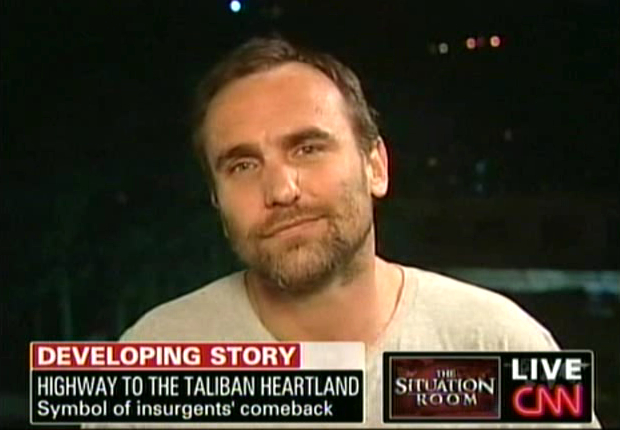TSR: "Highway #1 is now a mark of the American mission in crisis."
Monday, September 07, 2009

Length: 3:34
LARGE (41.2 MB) ----- SMALL (4.4 MB)
Michael is in Kabul and talks to Suzanne Malveaux about the disputed election results (still disputed; it is Afghanistan, after all...) and gives a bit of a preview on his report tonight about the Kabul-Kandahar road that had been one of the American success stories but now has fallen to the Taliban.
SUZANNE MALVEAUX: Weeks after Afghanistan's elections, there are growing allegations of fraud and intimidation.
Our CNN's Michael Ware, he's been taking the pulse in Afghanistan.
He joins us live from Kabul. Michael, we are hearing reports, lots of reports of suspicious vote totals and these polling stations, the neatly rounded numbers in favor of Karzai.
What are people telling you?
MICHAEL WARE, CNN CORRESPONDENT: Well, no one's really surprised. I mean, hello, Suzanne, it is an Afghan election. I mean the smoke and mirrors of these corruption allegations, any vote-rigging that did or did not go on, to a degree, is kind of meaningless. What rested on this election wasn't even the outcome, because as far as the Afghans are concerned, it's essentially one bunch of crooks for another bunch of crooks or one bunch of politicians with their warlord backers versus another bunch of politicians with their warlord backers. No one actually expects to be getting electricity or roads or hospitals in their village any time soon.
So what's important here is the fact that it's dragging out, that it's become messy. If you could have stolen the election quickly and clinically, that, arguably, would have been better than what's happening now.
This is robbing the election of any hope of legitimacy that it may have possibly had -- what tiny shred. And, of course, this blows back on the U.S. mission. The U.S. mission had very little to gain from this election. If it went smoothly, it's the crooks for the crooks. If it went badly -- if there was violence, if people couldn't vote or if there was, you know, if it becomes mired in allegations of corruption, all of which has happened -- then that does not look very well upon the American mission or the international mission here, that has supported this government and these elections -- Suzanne.
MALVEAUX: And, Michael, you have traveled down this very dangerous highway from Kabul to Kandahar. This is really the heartland of the Taliban, and Americans paid hundreds of millions, basically, to repave this. It was seen largely as a symbol of success.
Is it now a symbol of what's going wrong in the country?
WARE: Yeah. The Highway 1 is now a mark of the American mission in crisis. I mean it's just one very simple symbol of what's going on here in the country. Now, this is one of the country's major highways -- this Highway 1 linking the capital, Kabul, with the former imperial capital of Kandahar and the heartland of the Taliban and the heart of the fight. So it's vitally important.
Now, I remember when I was living here, that took a torturous 12 hours to travel. But in 2004, U.S. aid money saw reconstruction on the road. Bridges were rebuilt. Asphalt was laid. It became a five or six hour journey. Now, that journey is back up to nine or 10 hours.
Why? Because it's pockmarked with Taliban land mines and craters; because the bridges that were built have been destroyed again; and because the Taliban own that road -- not America, not the International Security Assistance Forces, not the Afghan security forces. There are Taliban checkpoints on the road. They pull buses over, sift through the passengers and execute who they don't like.
So for many Afghans, who are now forced to take flights instead of driving -- flights they can't afford, that are rarely so late, it's quicker to drive anyway -- this is the symbol of America's mission in crisis in Afghanistan -- Suzanne.
MALVEAUX: All right. Michael Ware in the middle of it all in Afghanistan.
Thank you, Michael.
